- Home
- Jim Eldridge
Murder at the Natural History Museum Page 7
Murder at the Natural History Museum Read online
Page 7
‘I’d like to see it,’ said Feather.
‘I regret that will not be possible,’ said Petter. ‘Client confidentiality takes precedence.’
‘Not when a murder’s involved,’ said Feather. He held out his hand. ‘The letter.’
Petter stared at him, shocked.
‘Murder?’ he gasped. Then he began to bluster. ‘This is nonsense. A skeleton was damaged at the Natural History Museum, so I’m informed. How can that be classed as murder?’
‘I’m talking about the murder of a young man at the museum. Strangled and left tied to a dinosaur. Now, let me see that letter and any others you have from this Bone Company.’
Petter looked at him, apparently lost for words, before blurting out: ‘I haven’t got them here in the office.’
‘No?’ said Feather, in disbelief. ‘Then you won’t mind if I look.’
‘Yes, I do mind,’ said Petter, moving to stand in front of the filing cabinet. ‘You can’t start searching here without a warrant.’
‘Then I’ll be back with a warrant. And if you try to stop the search, I’ll arrest you for obstructing the police.’
Feather headed for the door, then stopped and turned back to Petter.
‘Oh, by the way, Benny asked me to give you a message. He’d like you to visit him.’ He gave a smile as he added: ‘I got the idea he thinks you’ve been ignoring him. Not a nice way to treat a partner.’
CHAPTER TEN
When Daniel returned to the museum, he found Abigail organising space on the spare desk in Miss Scott’s secretary’s office.
‘We’re going to be in here from now,’ she told him. ‘Miss Scott thinks we could be at the museum for a while and she wants her own office back.’
‘That’s understandable,’ said Daniel. ‘Is Mrs Smith all right with that?’
‘I’m sure she will be,’ replied Abigail. ‘She’s out at the moment, but Miss Scott said she’d talk to her about it when she gets back. How did you get on with the Simpsons?’
‘Only Mrs Simpson. She’s a widow, and Raymond was her only living child. She’d had two others, but they died young, she told me.’
‘The poor woman,’ said Abigail. ‘She must have been upset.’
‘She was,’ said Daniel. ‘But she became much more upset when I asked her about Raymond being a witness at Oscar Wilde’s trial. She denied it absolutely. According to her he wasn’t even in London when the trial was on. She said he was in Brighton.’
‘But Superintendent Armstrong recognised him,’ exclaimed Abigail.
‘Exactly. So, either she’s lying, or he lied to her. Whichever it was, she became very angry when I brought the subject up and ordered me out of the house. So, I never got the chance to ask her about the accusation of him being a blackmailer.’ He gave a rueful smile. ‘I expect if I had she’d have hit me with something.’
‘The senior attendant at the museum, Mr Walpole, describes him as sociable, a nice enough young chap, polite, keen to engage in conversation with visitors,’ said Abigail. ‘That doesn’t fit with Armstrong’s view of him as some villainous blackmailer.’
‘Perhaps he changed his ways?’ suggested Daniel. ‘It does happen.’
‘So completely and in such a very short space of time?’ queried Abigail.
‘Plenty of blackmailers appear to be nice people on the surface,’ pointed out Daniel. ‘It’s how they worm their way into getting people’s confidence and finding out their dark secrets. We definitely need to look into young Raymond’s life and find out just what sort of person he really was. The problem is I think that information might be hard to get hold of. The only thing I learnt from Mrs Simpson was that he’d worked as an usher at the Lyceum.’
‘Yes, and also as a waiter, according to Mr Walpole.’
‘Mrs Simpson mentioned that as well, but she said she didn’t know which restaurant it was.’
‘Mr Walpole did,’ said Abigail, with a smile. ‘The Rigatoni on Cromwell Road.’
‘Very local,’ commented Daniel. ‘Which makes it seem strange that Mrs Simpson didn’t know it.’
‘I’d say suspicious rather than strange,’ said Abigail.
‘Yes, I agree. So that’s two places we can check him out at.’
‘Which one first? The Lyceum or the restaurant?’
‘I think the restaurant,’ said Daniel. ‘John Feather said he’d report back to us on how Superintendent Armstrong got on with talking to Mr Stoker at the Lyceum, so I don’t think we should go blundering in there until we know that outcome.’ He looked quizzically at Abigail. ‘No word from John yet, I assume?’
‘No. But then one never knows if the superintendent may have held him up for some reason.’
‘Knowing Armstrong, that’s very likely,’ said Daniel. ‘So, shall we go to the Rigatoni?’
‘He’s slippery, this Stoker,’ growled Armstrong. ‘I feel it in my bones.’
John Feather had come to the superintendent’s office to report on his interviews with both Benny Wardle and Erskine Petter, but found Armstrong seething with anger about the Lyceum’s business manager.
‘He’s involved in some way with this dead man at the Natural History Museum. It’s obvious. He turns up there and within minutes the man who’s given evidence against his best friend is found trussed up and murdered. It can’t be a coincidence.’
‘We’ll certainly be looking into it,’ Feather assured him.
‘But with caution,’ warned Armstrong. ‘We’re going to have to tread very carefully here, Inspector. Stoker is a man with powerful friends. If we put a foot wrong, we’ll feel the weight of the commissioner on our backs. How did you get on at the museum?’
Feather told the superintendent about the letter from Petter and Wardle, and what he’d learnt about the Bone Wars. ‘There’s definitely something wrong about Petter and Wardle. They may or may not be involved with the dead body, but as it followed so soon after the smashed dinosaur skeleton, and especially because this Erskine Petter denied me access to his records—’
‘Did he, by God,’ exclaimed Armstrong.
‘—I told him I’d come back with a warrant, and I’ve just got one.’
‘And I’m coming with you.’ Armstrong grinned as he got to his feet, a gleam of triumph in his eye. ‘That’s what I like: real villains.’
The Rigatoni was a small, intimate restaurant that appeared to cater to patrons at the upper end of the market. The seven tables were covered with pristine white tablecloths; the cutlery was silver, as were the cruet sets on each table. The walls were decorated with paintings by Italian masters. The face of the owner, Ginetta Morell, a rather rotund woman in her fifties, darkened as Abigail mentioned Raymond Simpson.
‘Who are you again?’ she asked, suspiciously.
‘Private investigators hired by the Natural History Museum to look into the death of Raymond Simpson, who we understand once worked for you as a waiter.’
‘How did he die?’
‘He was murdered.’
She scowled and muttered something in Italian that sounded like an oath.
‘You didn’t like him?’ asked Daniel.
‘I did not,’ she said. ‘But that doesn’t mean he deserved to die.’
‘What was he like? How did he strike you?’ asked Abigail.
‘When he first came to me to ask for a job, he seemed a very nice boy. Well-mannered. Eager to please. I tested him out for one day in the restaurant, and he showed that he knew how to deal with customers, polite and efficient. And with a smile. Good manner. So, I hired him.’ She scowled. ‘More fool me. I thought I could smell trouble, but he was too clever for me. He touched nothing for the first month he was here. In fact, he even handed in some money that a customer had dropped.’ Her face darkened again. ‘At least, that’s what he told me. But, thinking about it, perhaps he did that to show me he was honest.’ She gave a short sarcastic laugh. ‘Honest? Ha!’
‘I assume he stole from you?’ asked Daniel.
‘The secon
d month he was here. At first, small sums. Someone would have a little meal, and I believe he pocketed the money instead of paying it in. As I say, small sums so they wouldn’t be noticed. But then bigger. And then money began to disappear from the cash register.
‘I knew it had to be him because all the rest of my staff have been with me for years, so I set a trap. I marked a ten-shilling note and put it in the part of the cash register used as a reserve, so it wouldn’t go out with the change. When I checked, it had gone. I demanded he turn out his pockets. He refused. He got angry. When I insisted he threatened violence.’ She gave a caustic laugh. ‘Violence against me, who grew up with seven brothers, all of them hard fighting men.’
‘What did you do?’ asked Abigail.
‘I called my two best waiters over, and they took hold of him and made him turn out his pockets. There it was, the ten-shilling note, as I suspected it would be.
‘At first he claimed it must be a mistake, that he got it confused with change for a customer, but when I told him I was going to call the police he began to cry and beg. Said he had a widowed mother who was an invalid and he’d only done it this once because she needed medicines.’
‘You believed him?’
She shook her head.
‘But you didn’t call the police?’
‘No restaurant wants the bad publicity that goes with that kind of thing. Accusations of cheating by the staff. So, I took the money from him and kicked him out.’ She gave a satisfied smirk. ‘Literally. My boot up his backside.’ She looked pensive. ‘And now he’s dead. Murdered. I guess he cheated someone less forgiving than me.’
‘Do you remember when it was he actually worked for you?’ asked Daniel.
She nodded. ‘Earlier this year, April time.’
The door to the office of Petter and Wardle was locked. A note had been tied to the door handle: Away. Letters to Jones the Butcher downstairs.
‘Away,’ grunted Armstrong. ‘Let’s find out where he’s gone to.’
Ordering the constable they’d brought with them to wait beside the door, the superintendent and the inspector went downstairs and into the butcher’s shop, where a man in a striped apron was working on a sheep’s carcase with a knife, carving the ribs from the animal.
‘Mr Jones?’ asked Armstrong.
‘That’s me,’ said the man.
‘We’re looking for Erskine Petter,’ said Armstrong.
‘Are you now?’ said Jones, and he returned to butchering the sheep. ‘Well, he ain’t here.’
‘Where is he?’
Jones shrugged. ‘How would I know? He don’t work for me.’
‘He’s said for letters for him to be left with you,’ said Armstrong. ‘So where do you send ’em?’
‘Nowhere,’ said Jones. ‘I keep ’em till he comes back.’
‘And when will he be back?’
Again, the butcher shrugged. ‘No idea.’
Armstrong moved nearer to the butcher, his face a mask of anger as his last bit of patience vanished.
‘Now, listen you,’ he snarled, ‘we’re police—’
‘I didn’t think you were from the local chapel,’ snorted Jones, sarcastically.
‘—from Scotland Yard,’ snapped Armstrong, ‘and we’re investigating a murder. So, you can stop butchering that animal and pay attention, or I’ll take you down the Yard for questioning.’
This had the desired effect. Jones stopped working on the carcase and stared at the two policemen, worried. ‘Murder? Erskine never said anything about no murder.’
‘No, he wouldn’t,’ growled Armstrong. ‘Now, when do you expect him back?’
The butcher gulped nervously. ‘I don’t know. He never said. All he said was he had to go away and he didn’t know how long for.’
‘When did he go?’
‘About an hour or so ago.’
‘Just after I left him,’ said Feather.
‘Have you got a key to his office?’ demanded Armstrong.
‘No. I just take his letters in. That’s all.’
‘Where does he live?’
‘I don’t know,’ said Jones. As Armstrong moved menacingly towards him, the butcher held up his hands in desperate appeal. ‘I don’t! Honest!’
‘Did he take much with him?’ asked Armstrong.
Jones shook his head.
‘Just a big bag. One of them travelling bags.’
‘Right,’ said Armstrong. ‘My name’s Superintendent Armstrong. From now on you keep any sort of correspondence that comes for him, just like he told you. But I’ll be the one collecting it. Or an officer collecting it in my name. Have you got that?’
The butcher gave another nervous gulp and nodded. Armstrong turned to Feather.
‘Right, Inspector. Let’s get back upstairs.’
They left the butcher’s shop and returned up the stairs to where the constable was waiting for them.
‘Right, Constable, kick the glass in,’ ordered Armstrong.
The constable looked at the superintendent apprehensively.
‘I might cut my leg and bleed to death,’ he said.
‘All right, then, just kick the door in.’
The constable looked at the door warily.
‘Oh, for God’s sake!’ exploded Armstrong.
He pushed the constable aside, took up a position a pace back from the door, then smashed one of his heavy boots against it as hard as he could. The wood splintered, and a second kick took the broken door off its hinges.
Armstrong glared angrily at the constable.
‘That’s how you do it. Don’t you know anything?’
He stormed into the office. Feather looked at the unhappy constable and gave him a sympathetic shrug, then followed the superintendent.
CHAPTER ELEVEN
When Daniel and Abigail returned to the museum, Mrs Smith still wasn’t back. Nor had there been any word from Inspector Feather.
‘While we wait for them to arrive, I’d quite like to look at the exhibition,’ said Abigail. ‘With everything that’s been going on we haven’t had a chance to take a proper look.’
‘Yes, I’m quite intrigued by it myself,’ replied Daniel.
They made their way down from Mrs Smith’s office and into the Grand Hall.
‘There’s a good crowd today,’ said Daniel, noting that the number of visitors to the exhibition seemed to have increased substantially from the previous day.
‘It appears that Mr Stoker has succeeded in spreading word about the exhibition amongst his circle, as he promised Mr Sharp,’ said Abigail. She gestured towards a stout man wearing an expensive-looking suit and a florid, flowered waistcoat, his face adorned with a large bushy moustache that flowed into equally exuberant side whiskers. ‘William Schwenck Gilbert.’
Daniel scanned the rest of the crowd.
‘No sign of his partner, Arthur Sullivan,’ he commented.
‘If the stories about them are true, you’d be unlikely to see them together, except at a performance or when preparing a new production. It’s said they don’t get on. Sullivan resents the fact that he’s known for working with a comedy lyricist rather than his serious music, and Gilbert resents the fact that Sullivan has received a knighthood and he hasn’t. And their relationship has never recovered from a dispute Gilbert had with D’Oyly Carte. Gilbert claimed D’Oyly Carte was spending excessive amounts of their money on an opera composed by Sullivan, to the detriment of their joint work.’
Daniel sighed. ‘Money. The rift between so many friends and partnerships.’
It took some time for them to make their way around the exhibition, not just because of the crowds but because Daniel found each item fascinating enough to want to spend time examining it.
‘The archaeopteryx,’ he murmured as he studied the skeleton of the bird-like creature, and the reconstruction next to it with the display of feathers of different colours. ‘Fascinating. Here we have an identifiable bird, albeit with teeth. I’d always thought of dinosaurs
in terms of the large carnivorous creatures, rearing up with those terrifying teeth and claws.’
Abigail nodded. ‘Tyrannosaurus rex. But that is what is so good about this exhibition, it covers the range from those massive carnivores, and the even larger herbivores, the diplodocus and the stegosaurus, to the marine creatures and the flying pterodactyl.’
‘The triceratops is particularly intriguing,’ commented Daniel, gesturing at the huge four-legged skeleton with its massive frill of bone in several savage points around its neck. ‘It looks terrifying, very dangerous. And yet it turns out it was a herbivore. A vegetarian.’
‘The bony frill with its sharp points was for protection against carnivores,’ said Abigail. ‘Similar to a modern bull or bison, herbivores with horns to protect themselves against predators like wolves.’
‘Ah, there you are.’
They turned and saw that John Feather had arrived.
‘I’m sorry I’m later than planned,’ he apologised. ‘Armstrong insisted we go and serve a search warrant on Erskine Petter immediately.’
‘A search warrant?’ asked Daniel.
‘It came about after I went to see Benny Wardle in the Scrubs. I then went to see Petter at his office, and it was obvious that he was hiding something. He refused to let me look at his correspondence, so I went to get a search warrant. When Armstrong found out about it, he insisted on accompanying me. I got the impression it hadn’t gone well for him at the Lyceum with Stoker, so he wanted to do something to vent his anger.’
‘And did he? On Petter?’
Feather grinned. ‘On the door of Petter’s office. When we got there, Petter had vanished leaving everything locked. The superintendent kicked the door in.’
Daniel chuckled. ‘That must have cheered him up.’
‘It did, as did the haul of letters we found, proving that the letter he sent to the Natural History Museum was just one of a whole load he’d sent trying to extort money using legal jargon to intimidate people, but with no real basis for his claims.’
‘So, he wasn’t representing the Bone Company?’

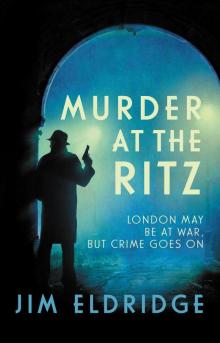 Murder at the Ritz
Murder at the Ritz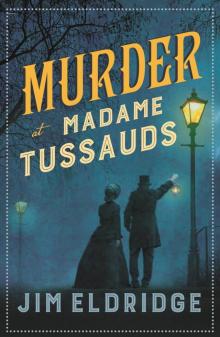 Murder at Madame Tussauds
Murder at Madame Tussauds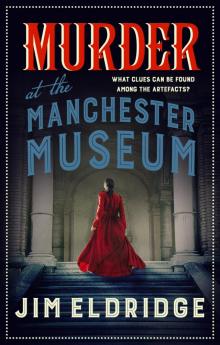 Murder at the Manchester Museum
Murder at the Manchester Museum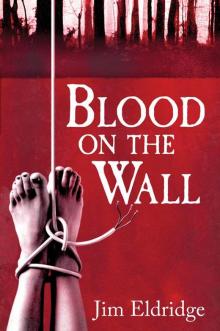 Blood On the Wall
Blood On the Wall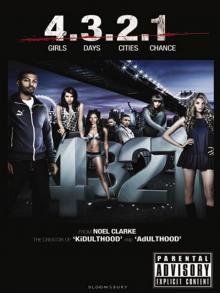 4.3.2.1
4.3.2.1 Jungle Kill (Black Ops)
Jungle Kill (Black Ops)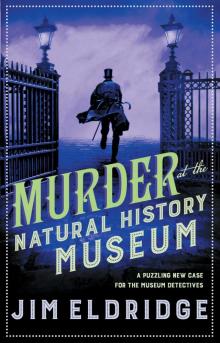 Murder at the Natural History Museum
Murder at the Natural History Museum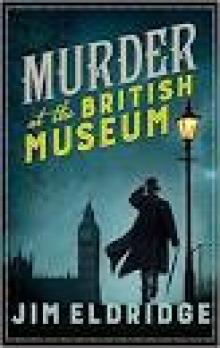 Murder at the British Museum
Murder at the British Museum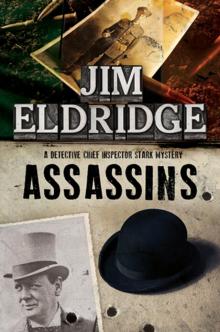 Assassins
Assassins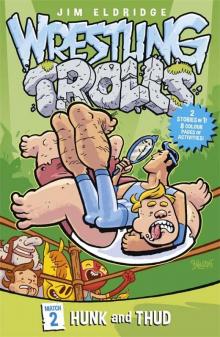 Hunk and Thud
Hunk and Thud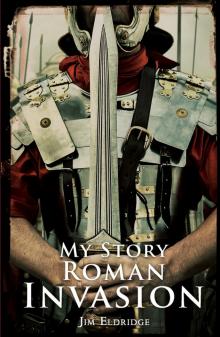 Roman Invasion
Roman Invasion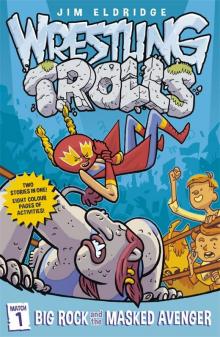 Big Rock and the Masked Avenger
Big Rock and the Masked Avenger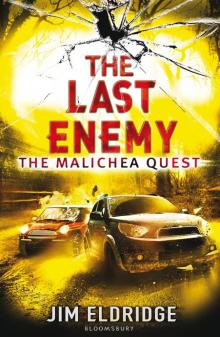 The Last Enemy
The Last Enemy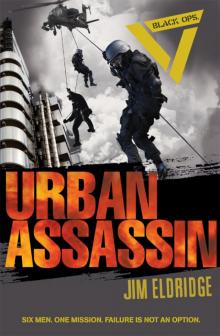 Urban Assassin
Urban Assassin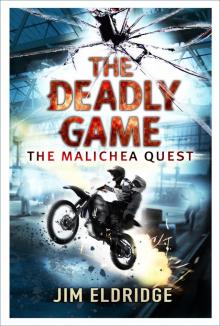 The Deadly Game
The Deadly Game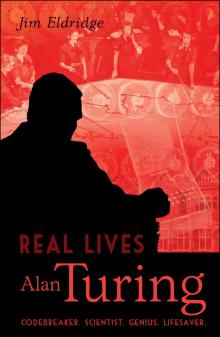 Alan Turing
Alan Turing The Lethal Target
The Lethal Target The Giant Rumble
The Giant Rumble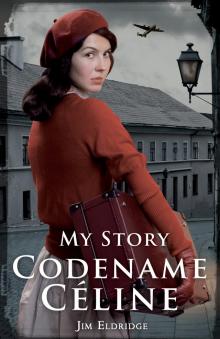 Codename Céline
Codename Céline Death in the Desert
Death in the Desert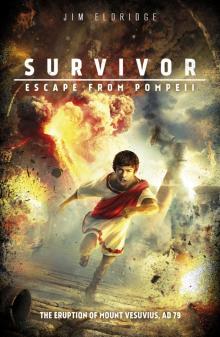 Escape from Pompeii
Escape from Pompeii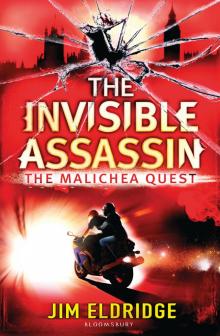 The Invisible Assassin
The Invisible Assassin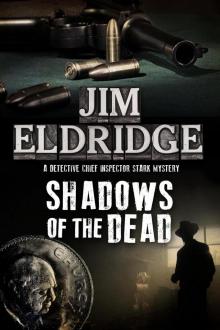 Shadows of the Dead
Shadows of the Dead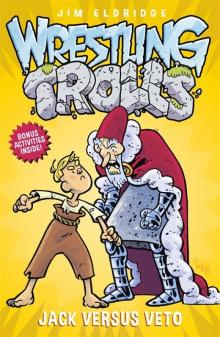 Jack Versus Veto
Jack Versus Veto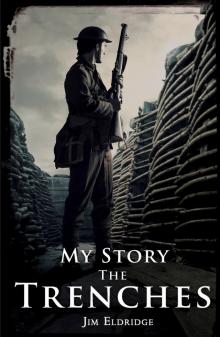 The Trenches
The Trenches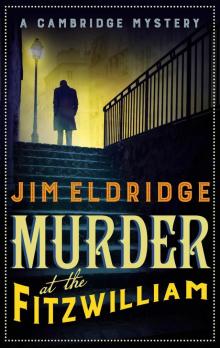 Murder at the Fitzwilliam
Murder at the Fitzwilliam Coming Home
Coming Home